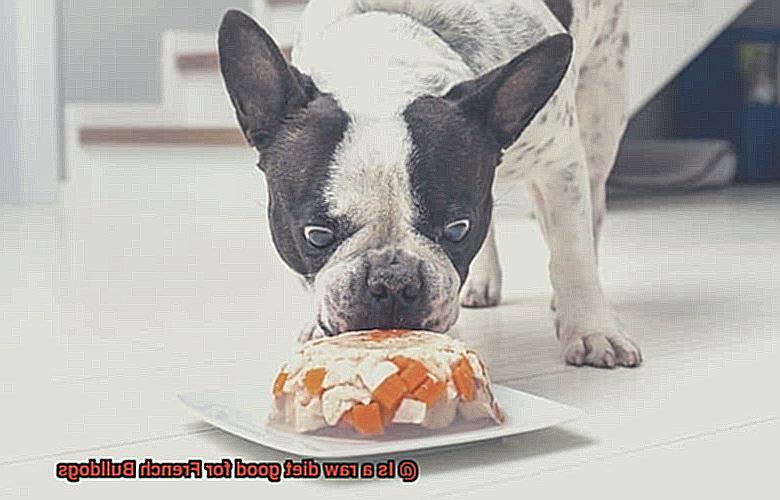Is a raw diet good for French Bulldogs?
French Bulldogs are cute, playful, and loyal companions that deserve the best care possible.
As pet owners, we’re always looking for ways to improve their health and wellbeing. One popular topic of discussion among Frenchie owners is whether or not a raw diet is good for them.
The answer isn’t straightforward, but I’m here to help you understand the pros and cons. Raw diets have become increasingly popular in recent years because they offer a more natural and nutritious source of food for pets.
However, it’s important to do your research before making any drastic changes to your dog’s diet. In this blog post, we’ll explore the benefits of a raw diet for French Bulldogs, such as improved digestion, healthier skin and coat, and better oral hygiene.
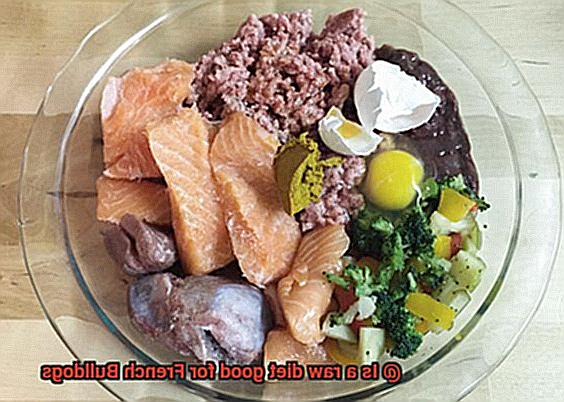
But we’ll also discuss some potential drawbacks like the risk of bacterial infections from raw meat and the added time required for meal preparation.
Ultimately, deciding whether or not to feed your Frenchie a raw diet is a personal choice that should be made with careful consideration and consultation with your veterinarian.
So, let’s find out.
Benefits of a Raw Diet for French Bulldogs
Contents
- 1 Benefits of a Raw Diet for French Bulldogs
- 2 Potential Risks of a Raw Diet for French Bulldogs
- 3 What to Consider Before Switching Your French Bulldog to a Raw Diet
- 4 Ensuring Proper Nutrition on a Raw Diet
- 5 Advantages and Disadvantages of Feeding Your French Bulldog a Raw Diet
- 6 Tips for Transitioning Your Dog to a Raw Diet
- 7 Conclusion
Raw diets have been growing in popularity among pet owners, and for good reason.
Feeding your French Bulldog a raw diet can provide them with numerous health benefits. One of the main advantages of a raw diet is improved overall health.
Raw food is composed of fresh, whole foods that are not processed or cooked, meaning they retain their natural nutrients and enzymes. This can help improve digestion, boost immune system function, and even promote healthier skin and coat.
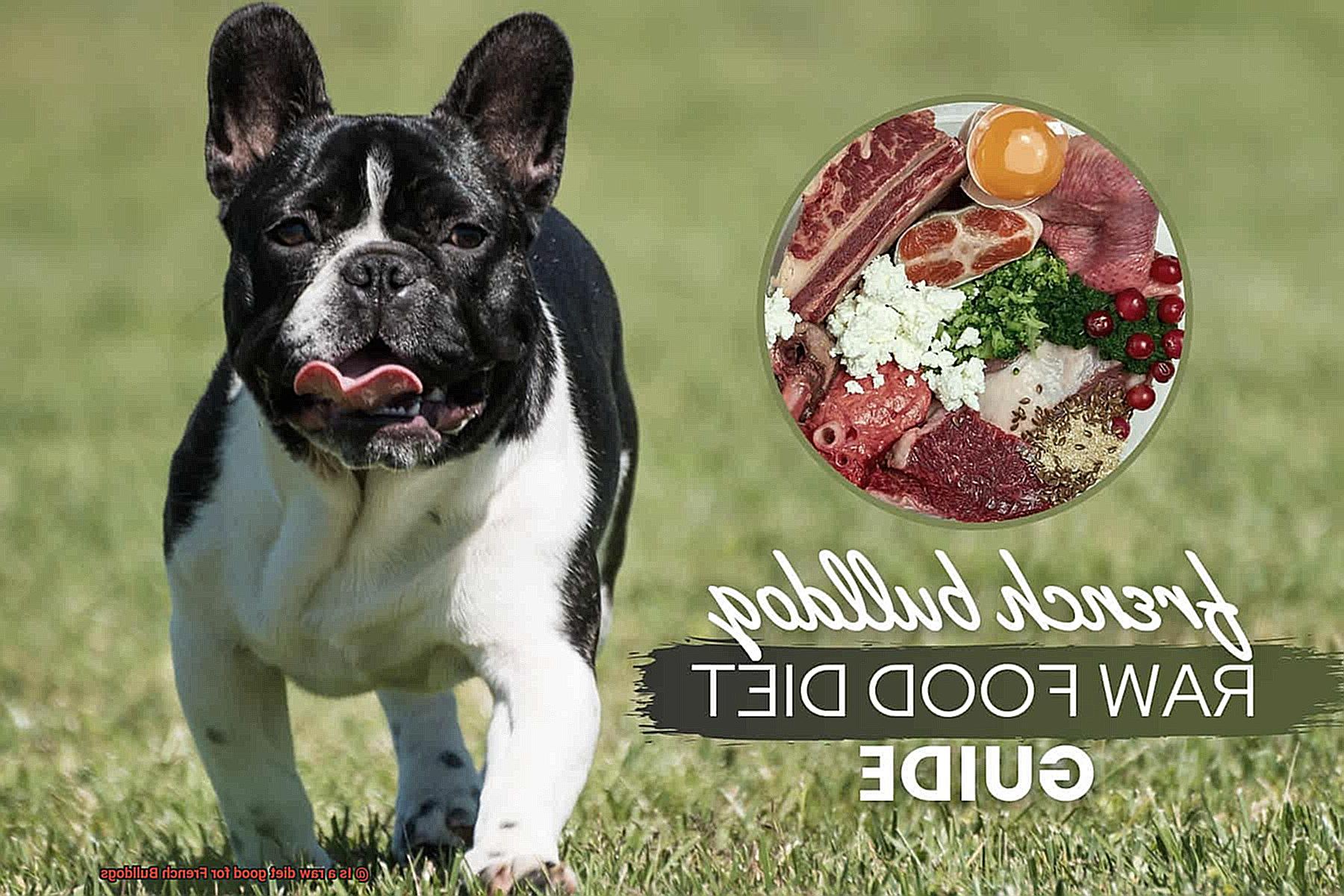
By feeding your French Bulldog a raw diet, you’re offering them a more complete and nutrient-dense diet. A raw diet can also help prevent common health issues that French Bulldogs are prone to, such as allergies and skin problems.
These issues can be alleviated by eliminating common allergens found in commercial pet food, such as grains and artificial preservatives. Another benefit of a raw diet for French Bulldogs is weight management.
Raw food is naturally lower in carbohydrates than commercial pet food, which can contribute to weight gain. Additionally, since raw food is more nutrient-dense than processed food, your French Bulldog may require less food overall to meet their nutritional needs.
It’s important to keep in mind that a raw diet does come with its risks, such as the presence of pathogens like Salmonella or E. coli in raw meat. However, with proper handling and preparation, these risks can be minimized.
Before making any significant changes to your pet’s diet, it’s crucial to consult with your veterinarian or animal nutritionist to ensure that it’s appropriate for their individual needs. They can help determine whether a raw diet is suitable for your dog and provide tips on proper meal planning and supplementation.
Overall, a raw diet can provide numerous benefits for French Bulldogs, including improved overall health, prevention of common health issues, and weight management.
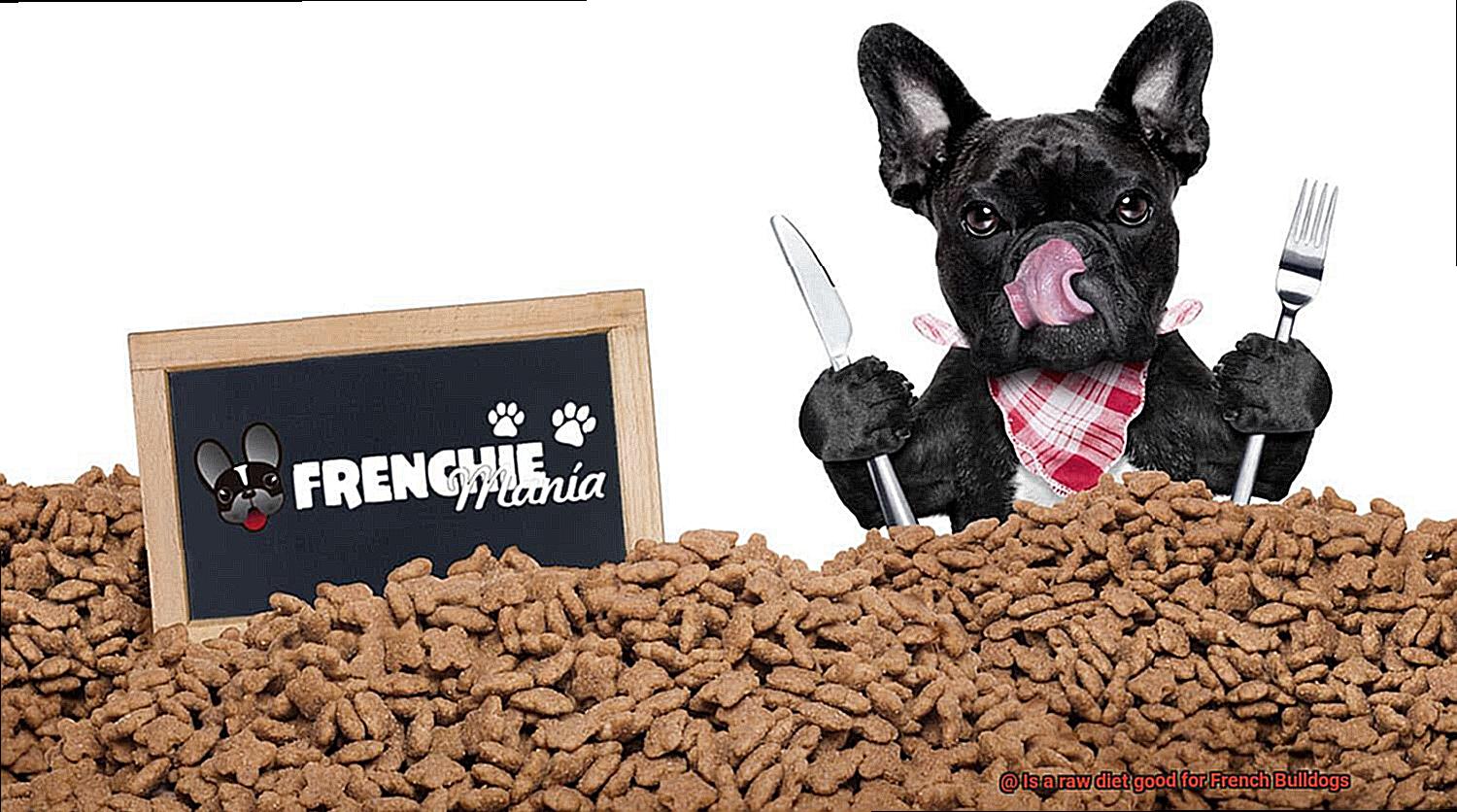
Potential Risks of a Raw Diet for French Bulldogs
While a raw diet might seem like a healthy and natural option, it’s important to be aware of the potential risks involved.
One of the biggest risks of a raw diet is bacterial contamination. Raw meat is often contaminated with harmful bacteria such as Salmonella and E. Coli, which can cause serious illness in dogs and humans alike.
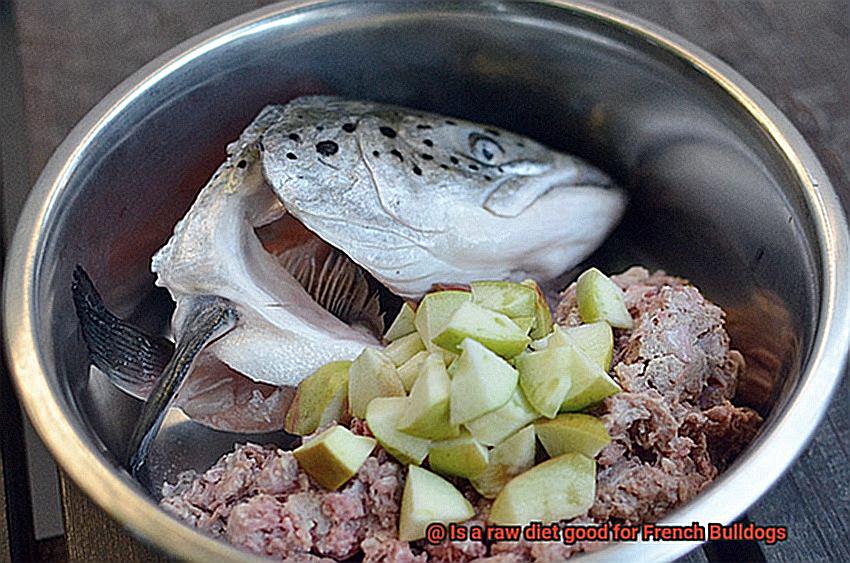
Feeding your French Bulldog raw food puts both you and your dog at risk for infection. Another concern with a raw diet is the potential for nutritional imbalances.

Raw diets may lack essential nutrients like calcium and vitamin D, which are crucial for growing puppies. Without adequate nutrition, your French Bulldog could face lifelong skeletal issues or weakened immune systems.
In addition to health concerns, a raw diet can also be expensive and time-consuming to prepare. Raw feeding requires careful planning and preparation to ensure that your dog receives all necessary nutrients.
This may involve sourcing high-quality meats, organs, and bones from reputable suppliers and preparing meals at home. While some advocates of raw diets claim that they offer several health benefits for dogs, it’s important to consider the potential risks.
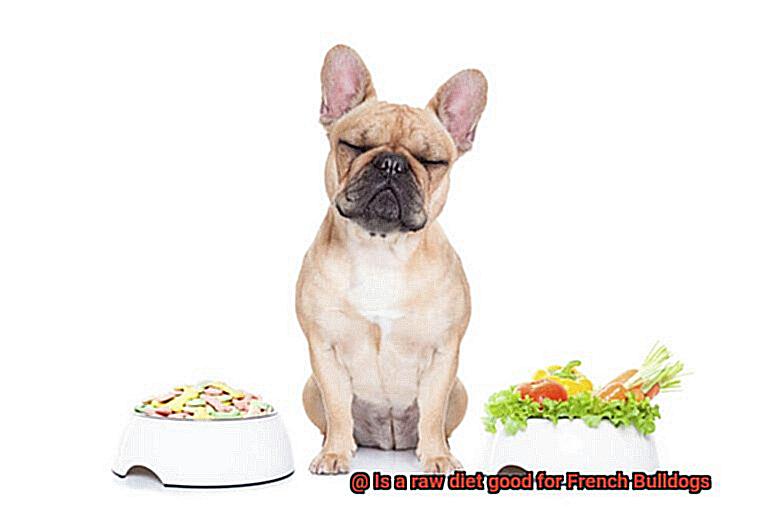
Before making any changes to your pup’s diet, consult with your veterinarian to ensure that their nutritional needs are being met and that any potential health risks are minimized. Remember, every French Bulldog is unique, just like people.
What to Consider Before Switching Your French Bulldog to a Raw Diet
If you’re considering switching your French Bulldog’s diet to a raw one, there are some critical things to think about before making the transition. Although a raw diet can provide many benefits for your pet’s health, it’s essential to make an informed decision.
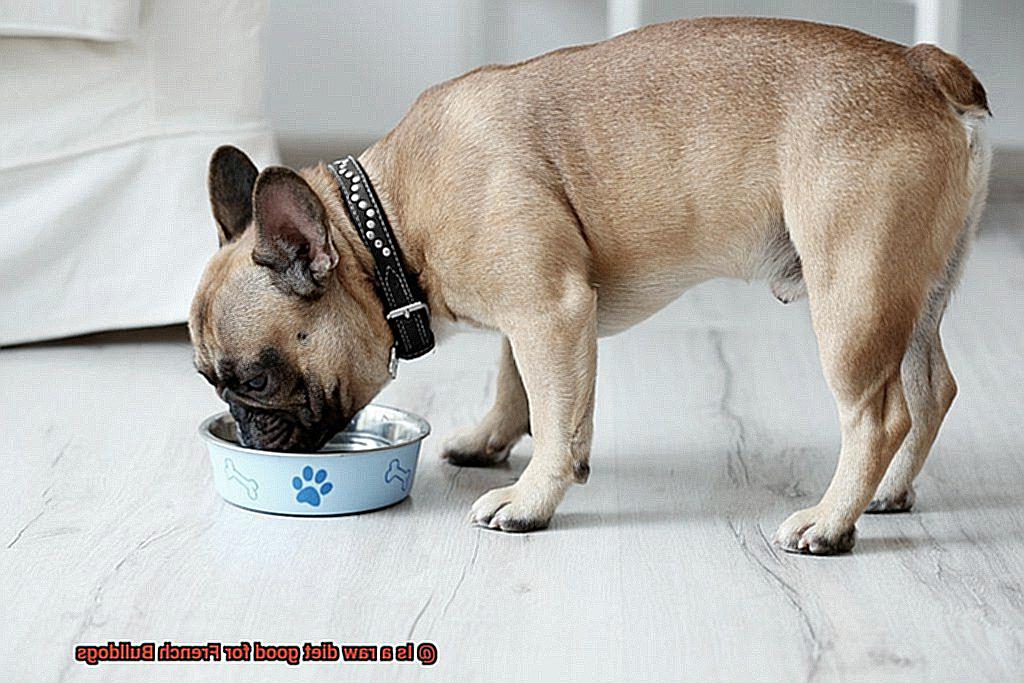
Firstly, it is crucial to consult with your veterinarian before making any changes to your dog’s diet. Your vet can help you determine whether a raw diet is appropriate for your French Bulldog, taking into account their age, health status, and any medical conditions they may have.
Secondly, it’s important to ensure that the raw diet you choose is nutritionally balanced and meets all of your dog’s dietary needs. This may require incorporating different protein sources and adding fruits and vegetables to provide essential vitamins and minerals.
Furthermore, it is also vital to consider the potential risks of a raw diet, such as the risk of bacterial contamination.
By following safe food handling practices when preparing your dog’s meals and properly storing raw meat, you can minimize this risk.
It’s also essential to consider the cost and convenience of a raw diet. Raw diets can be more expensive than traditional kibble diets, and may require more time and effort to prepare. It is important to factor these considerations into your decision-making process before making the switch.
Finally, closely monitoring your dog’s health after switching them to a raw diet is critical. Some dogs may experience digestive upset or other health issues when transitioning to a new diet. If you notice any concerning symptoms, it’s important to consult with your veterinarian right away.
Ensuring Proper Nutrition on a Raw Diet
While a raw diet can offer numerous benefits, it’s crucial to make sure that your pup is receiving all the necessary nutrients for optimal health.
Here are some tips for ensuring your French Bulldog’s nutritional needs are met on a raw diet. Variety is key when it comes to a raw diet for dogs.
Just like humans, dogs need a variety of nutrients to ensure optimal health. Providing a diverse range of proteins and vegetables will help ensure that your French Bulldog is receiving all the necessary vitamins and minerals.
Think of it like creating a gourmet dish – the more ingredients you have, the better the final product will be. Balancing calcium and phosphorus is also critical for your dog’s bone health.
As an expert, I suggest a 1:1 to 2:1 calcium to phosphorus ratio to eliminate skeletal abnormalities in your furry companion. Ensuring this balance is crucial in making sure your pup grows healthy and strong.
While a raw diet can provide many essential nutrients, supplements may still be necessary to ensure complete nutrition. Omega-3 fatty acids, vitamin E, and probiotics are just some examples of supplements that can further benefit your French Bulldog’s health.
These added supplements are like the finishing touches to a gourmet dish – they add more flavor and quality to the final product. Before making the switch to a raw diet, it’s essential to speak with a veterinarian who is knowledgeable about canine nutrition.
This specialist can help you create a balanced meal plan and monitor your dog’s health as they transition to their new diet. They are like trusted sous chefs, helping you create the perfect meal for your furry friend.
By providing variety, balancing calcium and phosphorus, adding vitamins as needed, and consulting with a veterinarian, you can ensure that your furry friend receives all the benefits of a raw diet without any adverse side effects.
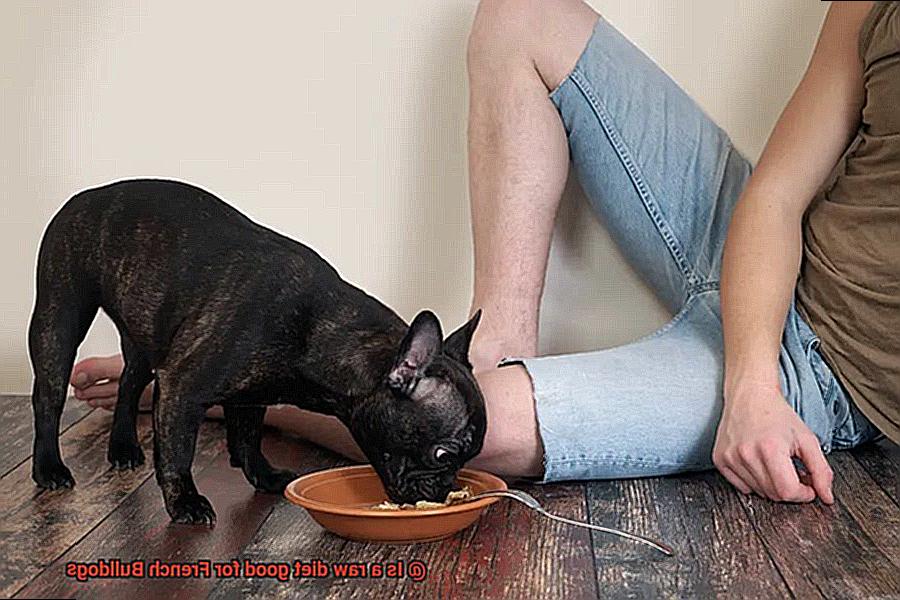
Advantages and Disadvantages of Feeding Your French Bulldog a Raw Diet
While traditional kibble diets are convenient, they may not always be the best alternative for your pup.
That’s where the raw diet comes into play. Feeding your French Bulldog a raw diet has become increasingly popular in recent years.
This type of diet can provide your dog with a more natural and nutrient-dense meal plan. Raw food typically contains more vitamins, minerals, and enzymes than processed kibble, which can help support your dog’s overall health and wellbeing.
The benefits of feeding a raw diet don’t stop there. Raw diets have been shown to support specific health conditions, such as allergies or digestive disorders.
By avoiding processed ingredients and focusing on whole foods, your French Bulldog may experience fewer health issues or be able to manage existing conditions more effectively. However, it’s important to consider the potential risks and drawbacks associated with feeding your French Bulldog a raw diet.
One of the biggest concerns is the risk of bacterial contamination from handling raw meat. If not handled properly, raw food can contain harmful bacteria that can make both you and your dog sick.
Another potential issue is ensuring that your French Bulldog is receiving a balanced diet. Feeding a raw diet requires careful planning and consideration to ensure that your dog is getting all the necessary nutrients they need to thrive.
This can be time-consuming and may require additional research or consultation with a veterinarian or animal nutritionist. Ultimately, whether or not a raw diet is good for your French Bulldog will depend on their individual needs and circumstances.
While there are potential benefits to this type of diet, it’s important to weigh the advantages against the potential risks and challenges before making any significant changes to your dog’s feeding routine. In conclusion, feeding your French Bulldog a raw diet can be an excellent way to provide them with a more natural and nutrient-dense meal plan.
However, it’s crucial to consider the potential risks and drawbacks associated with this type of diet before making any significant changes.
FRywoflGIMk” >
Tips for Transitioning Your Dog to a Raw Diet
Transitioning your French Bulldog to a raw diet can be a daunting task, but with the right approach, it can be a smooth and successful process. As an expert on the topic of raw diets for French Bulldogs, I can confidently say that transitioning your dog to a raw diet requires careful planning and preparation. Here are some tips that will help make the process as smooth as possible.
Start slow
When transitioning your French Bulldog to a raw diet, it’s important to do it gradually. This means introducing small amounts of raw food into their diet and slowly increasing the amount over time. Starting with a 25% raw food to 75% kibble ratio is a good place to begin. This will help avoid any digestive problems that may arise as a result of sudden changes.
Mix it up
Variety is key when it comes to feeding your French Bulldog a raw diet. Offering different types of meat, such as chicken, beef, and fish, will provide your pup with a range of nutrients. Experimenting with different types of organ meats and vegetables will also help ensure they’re getting all the nutrients they need.
Keep it balanced
A balanced raw diet for your French Bulldog should consist of 80% meat, 10% bone, and 10% organ meat. It’s important to ensure that your dog is getting all the necessary nutrients they need to thrive. You can achieve this by creating a meal plan or consulting with a veterinarian who is knowledgeable about raw feeding.
Consult with a veterinarian
Speaking with a veterinarian who is familiar with raw feeding can help you create a balanced meal plan for your French Bulldog. They can also provide advice on supplements such as probiotics, digestive enzymes, and fish oil to support your dog’s overall health during the transition period.
Monitor their health
As you transition your French Bulldog to a raw diet, it’s important to monitor their health closely. Look out for any changes in their stool, energy levels or overall demeanor. If you notice any issues, adjust their diet accordingly.
By following these tips, you can ensure that your French Bulldog makes a smooth transition to a raw diet and enjoys all the benefits that come with it. Remember, patience is key when transitioning to a new diet, so don’t get discouraged if your dog doesn’t take to it immediately. Keep offering new types of foods and monitoring their progress along the way.
Also Read: Can French Bulldogs Eat Liver? – Allfrbulldogs.com
Conclusion
In conclusion, whether or not a raw diet is the right choice for your French Bulldog is a decision that requires careful consideration and consultation with a trusted veterinarian.
While there are potential benefits to this type of diet, including improved overall health, prevention of common health issues, and weight control, it’s important to weigh the drawbacks and challenges as well. Feeding your furry friend a raw diet requires meticulous planning and preparation to ensure they receive all essential nutrients.
Before making any significant changes to their feeding habits, seek advice from a knowledgeable canine nutrition specialist. Transitioning your French Bulldog to a raw diet may seem daunting at first, but by taking small steps, varying their food choices, maintaining balance in their meals, consulting with an expert, and monitoring their wellbeing closely, you can help them adjust smoothly and reap the benefits.
Ultimately, whether or not a raw diet is beneficial for your French Bulldog depends on their unique needs and circumstances.
